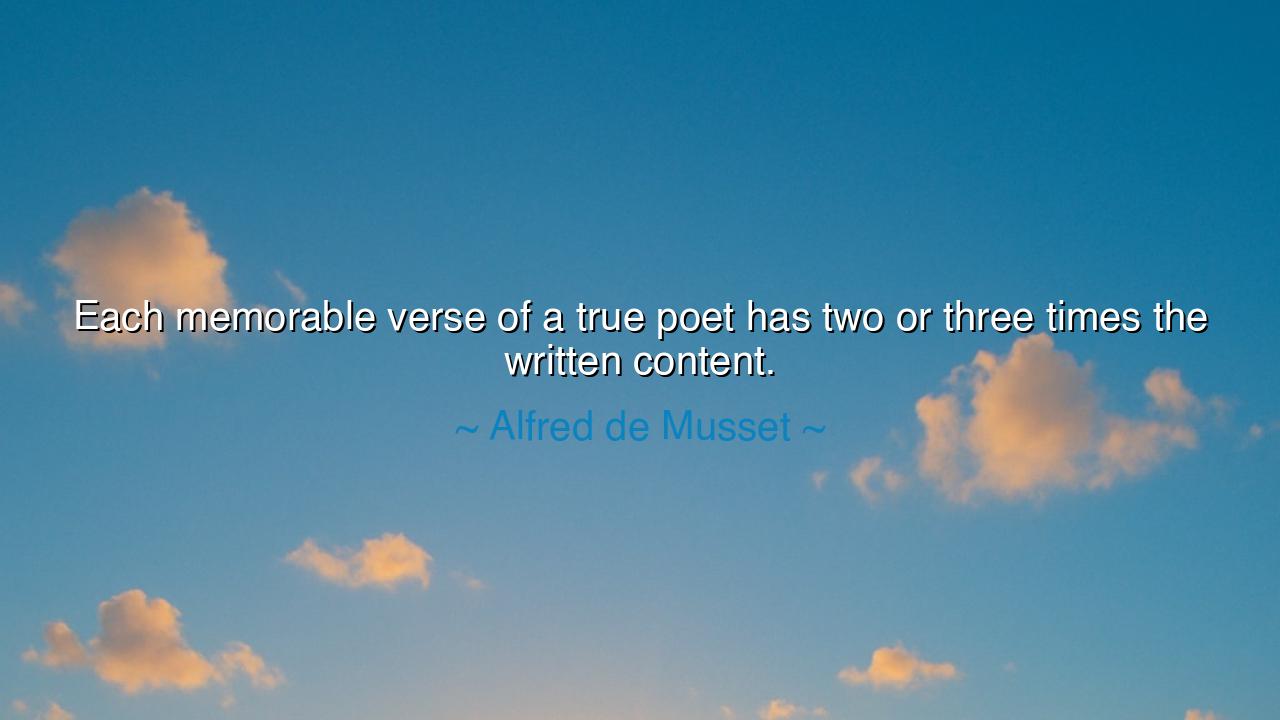
Each memorable verse of a true poet has two or three times the






Hear the voice of Alfred de Musset, poet of passion and melancholy, who spoke with luminous clarity: “Each memorable verse of a true poet has two or three times the written content.” In these words, he unveils the mystery of poetry, that a single line, simple to the eye, may carry within it depths beyond measure. The verse of the true poet is like a seed: small in form, yet containing within it a forest. The words are few, but the meanings, the echoes, the emotions they awaken—these are countless.
The meaning begins here: a memorable verse is not merely what it says, but what it stirs within the reader. When Homer wrote, “Sing, O Muse, of the wrath of Achilles,” he did not give only the beginning of a tale; he summoned visions of rage, honor, mortality, and the fate of nations. The line is short, yet it contains the thunder of war and the grief of heroes. This is what Musset declares: that the true poet writes not for the surface alone, but for the depth beneath, where meaning multiplies like light in a prism.
The ancients themselves knew this truth well. The haiku of Japan, with only seventeen syllables, captures whole seasons, philosophies, and lifetimes. Bash?’s verse about the old pond and the frog’s leap is a handful of words, yet it holds the silence of eternity, the passage of time, the awakening of the soul. To read it is to read far more than what is written. This is Musset’s teaching: the written content is but the vessel; the true poem carries what cannot be confined to ink.
History also gives us examples beyond poetry. Consider Lincoln’s Gettysburg Address: barely two minutes long, yet it carried the weight of a nation’s grief, hope, and vision for rebirth. Its words were few, but its meaning has multiplied across centuries, spoken in schools, echoed in battles for justice, remembered wherever liberty is cherished. Such speech is kin to poetry, for it teaches us that brevity, when filled with truth, can outlast tomes of empty discourse.
The power of compression is itself a mark of genius. Anyone can write long speeches, spilling emotion and thought without restraint. But the true poet condenses a universe into a verse, shaping language so that it holds more than it seems. Just as a diamond is the weight of carbon compressed into brilliance, so a memorable line is thought and feeling compressed into light. Musset honors this gift: the ability to say much with little, to conceal oceans within a drop of rain.
The lesson for us is both practical and profound. When you read poetry—or any words of weight—do not skim lightly. Read slowly. Let each line open before you like a door to hidden chambers. Ask yourself: what lies beneath this phrase? What echoes does it stir? Do not treat a verse as mere decoration, but as a window to worlds beyond. In your own speech, strive for clarity and depth rather than excess. Say less, but mean more.
Therefore, remember Musset’s wisdom: “Each memorable verse of a true poet has two or three times the written content.” Train your heart to listen for those deeper meanings. Value the words that stay with you, that grow as you return to them, that reveal new truths each time they are read. And in your own life, seek to speak with such weight and such care that your words, too, may carry more than what is written, and echo beyond the moment into eternity.






NTNguyen Vi Nguyen Thi
Alfred de Musset’s quote got me thinking about how much more poetry can say than what appears on the surface. It’s almost as if each line is a universe of its own, waiting to be explored. But does this depth make it difficult for modern readers who might be more accustomed to straightforward communication? How do we ensure that the richness of poetry isn’t lost in today’s fast-paced world, where depth can sometimes be overlooked?
HNHuong Nguyen
The notion that a memorable verse holds more than what’s written intrigues me. It speaks to the power of suggestion and the ability of words to trigger emotions, memories, and thoughts that aren’t immediately obvious. But does this complexity make poetry harder to appreciate for a casual reader, or does it give more meaning to those who invest in understanding it? How do we balance the beauty of poetic simplicity with this deeper, layered meaning?
APAnh Phuong
De Musset’s quote suggests that the best poetry transcends the literal meaning of its words. It’s as if every verse resonates on multiple levels, offering different interpretations to different readers. I wonder, though, does this idea mean that great poetry is only truly appreciated over time? Can its depth be fully understood in one sitting, or is the essence of it something that reveals itself gradually as you reflect more?
TVTien Nguyen Trinh Van
I really like Alfred de Musset’s perspective on poetry. The idea that a true poet’s verse carries more meaning than what’s written on the page makes me think about how poetry can evoke multiple layers of thought and emotion. It’s almost like each word or phrase holds hidden depths that unfold upon reflection. How does this concept apply to the works of poets we consider masters—do we always uncover those layers, or is it up to the reader’s interpretation?